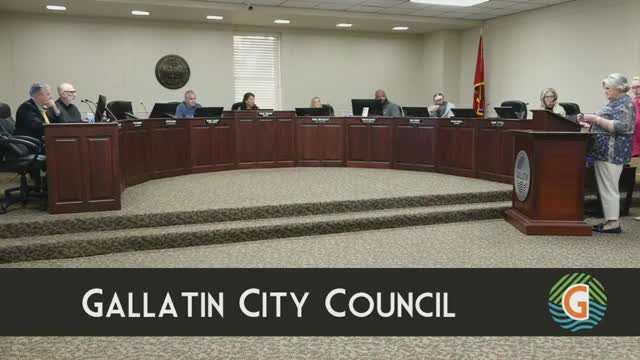Gallatin committee agrees to extend Project Phoenix exclusivity while council weighs city hall options
Get AI-powered insights, summaries, and transcripts
Subscribe
Summary
Councilors voted to forward an amendment extending developer exclusivity for Project Phoenix through Sept. 8 and began a substantive discussion about whether to retain, retrofit or rebuild city hall as the development’s design input.
The Gallatin City Council Committee voted April 8 to forward an amendment extending exclusivity for the Boyle Group on Project Phoenix through Sept. 8, allowing the developer additional time to complete schematic design and reach a potential project agreement with the city.
Project Phoenix is a multi‑phase, mixed‑use downtown redevelopment proposal that would occupy the City Hall block and adjacent blocks, replacing and adding retail, hotel, multifamily housing and other uses. Economic impact figures presented by economic development staff showed large long‑term totals: Rosemary Bates told the committee that an independent economic impact assessment projects nearly $1.5 billion in total economic impact over a 20‑year period, with annual city property tax receipts estimated at about $500,000 once developed. Bates said the current properties generate little or no tax revenue.
Boyle representatives said they have spent nearly $100,000 in soft costs to date on due diligence and schematic design. John Harlan of Boyle said the developer is in a critical schematic stage and needs guidance about whether the city intends to retain the existing City Hall on the block or to build a new facility; that guidance will materially affect the project’s design, parking approach and feasibility. Harlan said continuing exclusivity for the developer is important so the private partner can refine design options that depend on the city’s direction about City Hall.
Bates and Boyle representatives described two divergent development tradeoffs: retaining and reinvesting in the current City Hall limits opportunities for below‑grade parking, while rebuilding City Hall could allow for substantial subsurface parking and a pocket park in the project footprint. Bates said a new building could reduce above‑ground parking, freeing more area for revenue‑generating uses.
Council members pressed for more detail on the economic analysis and costs to the city of potential relocation or demolition of City Hall and the Fire Department site. Councilman Chavvan questioned some assumptions in the economic impact study (noting occupancy and retail revenue figures he considered optimistic) and asked for clearer, city‑side cost estimates. Bates and staff said cost estimates depend on the specific design choices and that additional analysis and meetings with the developer and consultants would be needed before firm city cost figures could be provided.
After discussion a motion to draft and forward an amendment to the existing memorandum of understanding—extending the exclusivity period to Sept. 8 and preserving the developer’s exclusive negotiation rights during schematic design—was seconded and the committee voted to send the amendment to the full council for consideration. Council members were asked to review the Project Phoenix materials and to expect follow‑up briefings; staff will have an amended MOU drafted by the city attorney for council consideration.
No final decision was made on the City Hall site itself during the meeting; councilors were asked to weigh options and to provide direction in the coming weeks so Boyle can continue design work under the MOU timetable.
